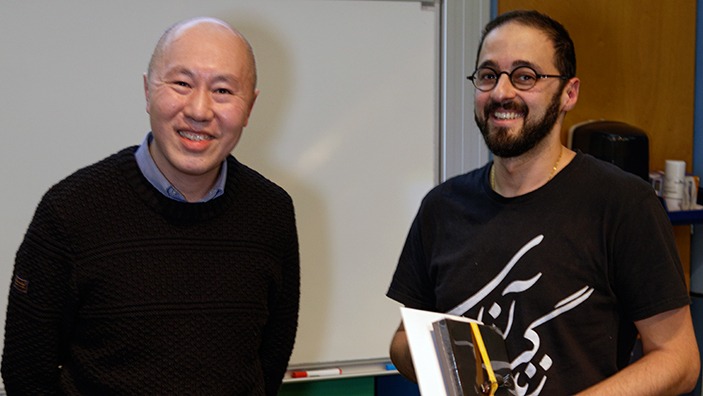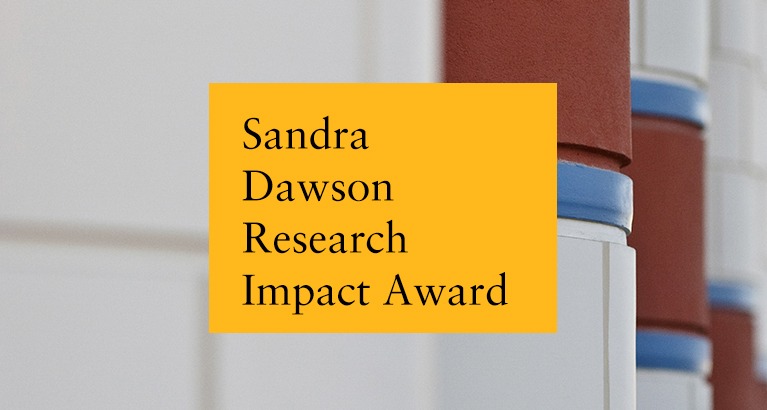Cambridge Judge Business School faculty members Mark de Rond and Kamiar Mohaddes were awarded the 2023 Sandra Dawson Research Impact Award for their significant contributions to creating real-world impact through their research.
The awards – for Mark’s work on paedophile hunting groups and Kamiar’s work on climate change – were announced at a ceremony on 9 November. The awarding panel applauded the recipients for “seeing beyond the boundaries of academia and fully engaging with non-academic organisations to inspire meaningful change”.
Reach and significance in effecting meaningful change
The annual award was established through a generous donation from Professor Dame Sandra Dawson, a former Director of Cambridge Judge. Winners are chosen based on reach (the extent and diversity of the organisations which have benefited from the research) and significance (the degree to which the impact has influenced or changed the policies, opportunities, perspectives or practice of non-academic organisations).
How embedding with paedophile hunters brought unique insight

Mark de Rond, Professor of Organisational Ethnography and a Fellow of Darwin College, was recognised for his project focusing on the practices and motivations of UK ‘paedophile hunting’ groups. By embedding for 4 years with one of the UK’s most prolific hunting teams, Mark offered unique insights to police, the Home Office, the Crown Prosecution Service and National Crime Agency into why hunters persist with extreme methods in view of less harmful alternatives to keeping children safe.
Mark’s 2022 article in the Academy of Management Journal, “To catch a predator: the lived experience of extreme practices”, and forthcoming book with Cambridge University Press draw on his 4 years of direct contact with paedophile hunters, extensive field notes and private team chat. This research basis enabled Mark to bring a nuanced understanding to a national working group, and to hold a first-of-its-kind listening project between police and one of the UK’s most successful paedophile hunting groups, funded by the University of Cambridge Research England Policy Support Fund.
Dan Vajzovic, Deputy Chief Constable, Bedfordshire Police, said of Mark’s work: “Your in-depth field work was not something that the police or the wider criminal justice system could have achieved.” Sarah Robertson, Senior Policy Adviser, Tackling Child Sexual Abuse Unit, Home Office, said: “Your work has proven insightful and a uniquely helpful resource when considering OCAGs (Online Child Sexual Abuse and Exploitation Activist Groups) and OCAG policy.”
Climate change paper referenced by US Congress in letter to Fed

Kamiar Mohaddes, Associate Professor in Economics & Policy and a Fellow of King’s College, was recognised for his work impacting climate change and net-zero policy. Kamiar’s paper in the journal Energy Economics on the economics of climate change, has been referenced extensively by the US Congressional Budget Office and 25 members of Congress in a letter to the Chair of the Federal Reserve Board. The letter expressed “concern over the limited action of the Federal Reserve (‘Fed’) to prepare our financial institutions and broader economy for the risk and destabilising impact of climate change” and worries that “progress will be both too slow and insufficient in scale to adequately address the reality of the crisis our economy and our planet face.” This work was also among the 5 research projects globally that was highlighted by the Financial Times in 2023 as outstanding work on sustainability research, and an Oxford University Press video about this work has got over 400K views.
Building on this work, Kamiar’s paper in the journal Management Science on the effects of climate change on sovereign creditworthiness received recognition as a runner-up in the 2022 Financial Times Responsible Business Education Awards. He is currently using his expertise to bridge the gap between academic research and policymaking and industry practice in the built environment. Kamiar’s co-authored study “Social media enables people-centric climate action in the hard-to-decarbonise building sector” provides one element of the research-led basis for an ongoing interdisciplinary project funded by the EPSRC Impact Accelerator Account Rapid Response Fund. This University of Cambridge project is designing knowledge translation options that can be implemented at speed and scale, first in the UK and then expanded internationally.
Featured faculty
Kamiar Mohaddes
Associate Professor in Economics and Policy
Director of the Global Executive MBA Programme


